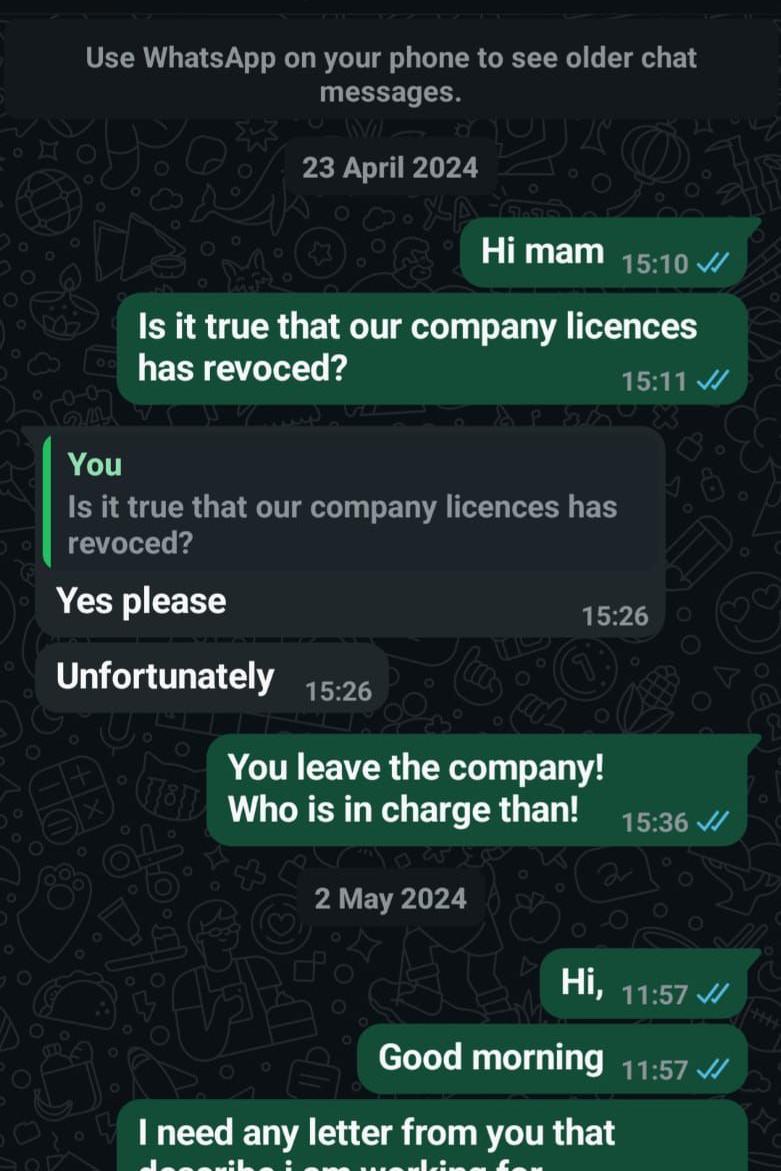Migrant workers 'in limbo' over employer licence crackdown

Bengali careworker Jamil said he applied for "hundreds of jobs" with no luck after his company lost its licence
- Published
"I've lost everything. Every day I'm stressed."
Jamil, a migrant worker from Bangladesh, says he has been left stranded and in limbo after being exploited and then abandoned by a company who recruited him to help fulfil the UK's shortage of care workers.
Following a crackdown from the government, the company he had been working for lost its licence to employ foreign workers.
Now the 30-year-old does not know what to do.
He's not alone - figures obtained to the BBC under the Freedom of Information Act show the number of times a company had its sponsor licence revoked in the UK rose from 336 in 2023 to 1,514 in 2024 - a rise of 350%. Over a third were in London.
The effect has meant migrant workers have been "pushed into destitution", the Joint Council for the Welfare of Immigrants told the BBC, adding that it had seen a huge increase in people seeking their services.
'I paid for payslips'
Jamil - not his real name - was approached by the company, which the BBC is not naming, after he completed a business masters degree in the UK.
"I saw there was a shortage in care workers in the country and I thought I could give something to this country," he said.
He completed training, reference checks, and received a visa through the company.
But the work never followed.
"I had to wait six months," he said.
"From the beginning, they were wasting time. If they don't have jobs, why are they recruiting us? I felt something fishy was going on."
Jamil said he felt he was exploited by the company as he gave them cash, which he borrowed from friends and family, in return for payslips of less monetary value in order to "keep his documents up to date".

The company ignored Jamil after the licence had been revoked
After finding out the company's licence had been taken away, the company stopped contacting him.
"I've applied for hundreds of jobs but it's so much stress. I've lost everything," he said.
He has not received a curtailment notice - a document which formally indicates the Home Office is cancelling or shortening a visa before its original expiry date.
"Every day I wake up and wonder if I've got any email from them. I can't explain the stress. It's been more than a year. Sometimes I think I should go back home but what could I do from there?"
He added: "I have applied for hundreds of jobs but they require driving licence so I'm learning to drive."
Bosses said I'd lose visa if I complained - care worker
- Published16 April
Big fall in migrant visa applications after changes
- Published9 August 2024
Rajan - not his real name - is a migrant worker from Bangladesh who was recruited by a care company before arriving in the UK.
He says he was made to work 14-hour shifts in a care home for 60 days in a row, and his requests for sick and holiday leave were repeatedly denied by the company.
"I kept asking my manager to have a break during Ramadan to celebrate and do some prayers. I asked for time off to go to my GP when I was sick. They didn't allow me the break - I was fully controlled by my employer."
Although the company lost its licence to employ foreign workers, the 36-year-old said the company continued asking him to work.
He says he has been rejected from hundreds of jobs.
"I just keep borrowing money from my relatives and friends. I've become isolated, I don't talk to anybody," he said.
He told the BBC he had contacted the police and the Home Office but had not received a response.

In order to hire a foreign worker in the UK, companies must obtain a sponsor licence from the UK Home Office.
In 2022 the UK government opened skilled worker visas to overseas care workers, in a bid to tackle record staff shortages in the care sector.
Sairah Javed, a solicitor at the Joint Council for the Welfare of Immigrants, believes not enough checks and balances were in place at the time for licence applications to sponsor these overseas care workers.
"Within that application process, there needed to be greater due diligence and it would seem the Home Office hadn't done that at that early stage," she said.
In November last year, the government announced new measures to crack down on visa abuse and prevent exploitation.
These include banning companies who flout visa rules or breach employment laws for at least two years from sponsoring oversea workers, and the passing of sponsorship costs to "often vulnerable workers" will be prohibited.
'Months of limbo'
More than 39,000 workers, external in the care sector have been affected by sponsorship licences being revoked since October 2020.
Minister for Migration and Citizenship Seema Malhotra said there were "serious consequences for those who don't respect our visa system, and treat workers unfairly".
"We have already banned companies from charging workers for the cost of their sponsorship, and will be barring employers who repeatedly break immigration or employment laws from hiring overseas workers," she added.
"In close collaboration with the care sector, we are also supporting care workers into alternative jobs when their sponsor has had their licence removed."
She added: "I urge anyone with evidence of abuse or wrongdoing to come forward and safely report this to us and the relevant authorities so we can thoroughly investigate exploitative criminals."

Sairah Javed, a solicitor at the Joint Council for the Welfare of Immigrants
But many are struggling.
"They've been pushed into destitution, into months and months of limbo and uncertainty, unable to support themselves or their families," said Ms Javed.
"Finding an alternative sponsor is extremely difficult. You have migrant workers who are forced into destitution because they can't work at all when they are in this limbo state."
She added the Joint Council for the Welfare of Immigrants had experienced a three-fold increase in people coming to the Unison advice line on a weekly basis.
Migrants were also seeing long delays in receiving their curtailment notices, which is not an automated process.
When a care provider's sponsor licence is revoked, UK Visas and Immigration write to all impacted workers and signpost them to partnerships for help finding new sponsored employment.
The Work Rights Centre, a charity that helps migrants access employment justice, is calling on the government to introduce a UK Workplace Justice visa which would protect the immigration status of a victim while they find new employment, and take legal action against their former employer.
Its chief executive, Dr Dora-Olivia Vicol said: "We have a work migration system that puts employers in a position of great power - they hold the keys to a person's immigration status but the system doesn't come with any safeguards for migrant workers."
From 9 April, care providers who want to recruit a new worker from overseas now have to first prove that they have attempted to recruit a worker from within England, external.
A change that, for migrant workers, may make searching for a new sponsor company even more difficult.
Listen to the best of BBC Radio London on Sounds and follow BBC London on Facebook, external, X, external and Instagram, external. Send your story ideas to hello.bbclondon@bbc.co.uk, external